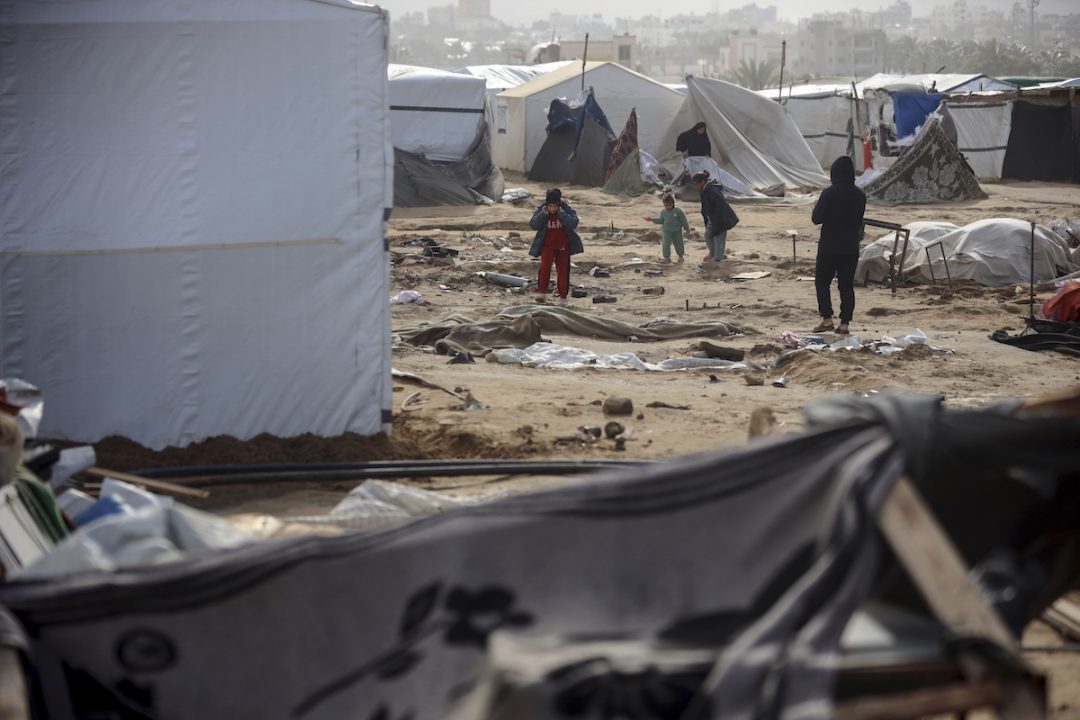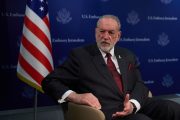
Israel is accelerating military plans to expel Palestinians from Gaza. The plan, largely condemned as ethnic cleansing, aligns with President Donald Trump’s vision for Gaza, which seeks to displace Palestinians to other countries while transforming the war-ravaged enclave into the “Riviera of the Middle East.” Both Israel and the United States frame the move as a humanitarian effort.
Katz’s Statement
Israeli Defense Minister Israel Katz took to X to justify the expulsion of Palestinians from Gaza, presenting it as a facilitation of the voluntary migration.
The minister said that he had directed the Israeli Defense Forces (IDF) to “develop a plan” to enable any residents of Gaza who wish to leave to do so, to any country willing to receive them.
Further, he insisted that Hamas was the true cause of Palestinian suffering. He claimed that “Hamas has used the residents of Gaza as human shields.” According to Katz, the group “built its terror infrastructure in the heart of the civilian population,” and “holds [civilians] hostage — extorting money from them through the humanitarian aid system and preventing their departure from Gaza.”
Katz then argued that Western nations criticizing Israel should take responsibility for accepting Palestinian refugees:
Countries such as Spain, Ireland, Norway, and others, which have falsely accused Israel over its actions in Gaza, are legally obligated to allow Gazans to enter their territory. Their hypocrisy will be exposed if they refuse.
Katz also welcomed Trump’s proposal for permanent resettlement, stating:
I welcome President @realDonaldTrump bold initiative, which can create extensive opportunities for those in Gaza who wish to leave, assist them in resettling in host countries, and support long-term reconstruction efforts in a demilitarized, threat-free Gaza after Hamas — an effort that will take many years.
He emphasized that Israel would facilitate this process by preparing exit options via land crossings and special arrangements for departure by sea and air. Katz also stressed that Gazans “should have the right to freedom of movement and migration, as is customary everywhere in the world.”
“Migration” at Gunpoint
While Katz presents the plan as an opportunity for Palestinians to leave voluntarily, the reality of forced displacement cannot be masked by diplomatic language. First of all, the destruction of homes and infrastructure, as well as the ongoing blockade, have left residents with no real choice.
Moreover, Katz places the Israeli military at the center of the process, overseeing the departure of Gazans. This alone undermines claims that people are leaving willingly. When an occupying army is involved in a population’s removal, it is not migration. It is either a forced displacement or ethnic cleansing, both grave violations of international law. The presence of armed forces in such a process inherently creates coercion, making staying an impossible option.
Katz’s claim that Western nations are legally obligated to accept displaced Palestinians is baseless. As the occupying power, Israel bears responsibility for the well-being of civilians under international law. The Fourth Geneva Convention explicitly prohibits the forced transfer of populations. Deflecting responsibility onto other nations does not change the reality that Israel is violating international law by expelling Gazans.
Additionally, Katz’s endorsement of Trump’s resettlement plan contradicts claims that this is a temporary measure. If displacement were voluntary, there would be no need for international negotiations on permanent resettlement. Freedom of movement means the ability to leave and return — not permanent removal from one’s homeland.
From Warzone to Riviera?
Wednesday’s statements from the White House and Secretary of State Marco Rubio have sparked debate over whether the cleansing of Gaza will be permanent or temporary. The discussion escalated after officials appeared to walk back Trump’s initial statement on permanent displacement, with Press Secretary Karoline Leavitt and Rubio insisting that any resettlement of Palestinians would not be permanent.
However, the sheer scale of destruction makes such claims meaningless. In the first nine months of war, Israel dropped more than 70,000 tons of bombs, obliterating entire neighborhoods and displacing more than 90 percent of Gaza’s residents. The current scale of devastation suggests a deliberate effort to make Gaza uninhabitable, rather than a targeted campaign aimed solely at Hamas. It is difficult to believe that those responsible for leveling Gaza would suddenly have a change of heart and welcome its people back.
Speaking at the White House alongside Israeli Prime Minister Benjamin Netanyahu on Tuesday, Trump strongly implied that Palestinians would not be returning.
On Thursday, Trump reiterated this position on Truth Social. He asserted that Gazans would be better off staying in “far safer and more beautiful communities.”
The contradiction is clear — while the White House now claims displacement is temporary, the reality of Gaza’s destruction and the rhetoric from its architects and backers tell a different story.
Palestinians Respond
The Palestinian Authority firmly rejected the displacement plan, stating it would not allow Palestinian rights “to be infringed upon.” President Mahmoud Abbas condemned the proposal as a “serious violation of international law” and reaffirmed that “peace and stability will not be achieved without the establishment of a Palestinian state with Jerusalem as its capital on the borders of June 4, 1967.
Hamas officials condemned Trump’s proposal to expel Palestinians from Gaza, calling it “racist” and an attempt to “eliminate the Palestinian issue.” They declared that Gazans “will not accept any plan aimed at uprooting them,” and warned that the proposal would fuel “chaos and regional tensions.”
Regional and Global Backlash
Trump’s plan to displace Palestinians from Gaza to other countries, primarily Jordan and Egypt, has garnered widespread condemnation across the Middle East and beyond.
Saudi Arabia, a close U.S. ally, unequivocally rejected Trump’s proposal for the United States to take over the Gaza Strip and relocate its Palestinian residents. The Saudi Foreign Ministry emphasized that the kingdom would not establish ties with Israel without the creation of a Palestinian state.
Similarly, Jordan’s King Abdullah II stated that he opposes any attempts to annex land and displace Palestinians.
Egyptian officials have reportedly conveyed to the Trump administration and Israel that such a plan could destabilize the region and jeopardize Egypt’s peace treaty with Israel.
European Union leaders rejected Trump’s proposal, calling it an unacceptable and “serious” violation of international law. They signaled that the bloc continues to back a two-state solution and oppose any forced displacement. In addition to that, the Europeans warned that Trump’s proposal undermines international stability and risks long-term regional conflict.
Related:
Trump: U.S. to “Own” and Rebuild Gaza, Displace Its People
“Cleaning Out” Gaza: Egypt and Jordan Reject Trump’s Relocation Calls





